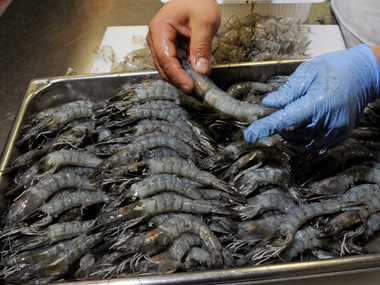New York: The US Department of Commerce is strengthening an investigation that could lead to import duties on $4.2 billion a year in shrimp imported from India and six other countries after a US trade agency backed the petitioners.
The US International Trade Commission determined this week that US companies were hurt by shrimp imported from India, China, Vietnam, Indonesia, Malaysia, Thailand and Ecuador, marking a step toward the potential imposition of countervailing duties.
The US International Trade Commission preliminarily determined, with a 5-1 vote, that there is a “reasonable indication” that US industry is “materially injured” by imports of frozen warm water shrimp from the seven countries which provide government subsidies.
The Coalition of Gulf Shrimp Industries, which represents shrimp fisherman in Texas, Alabama, Florida, Georgia, Louisiana and Mississippi, asked for the probe in late December, saying their industry was at risk because of lower-priced imports from the seven countries.
[caption id=“attachment_624883” align=“alignleft” width=“380”] The group says it has documented over 100 programmess that provide benefits to shrimp producers in the seven countries, including low-interest loans, tax breaks, even shrimp feed. AFP[/caption]
Subsidized imports since 2009 have “suppressed and depressed domestic prices,” undercutting US sales and destroying jobs, the Coalition of Gulf Shrimp Industries said in a December 28 statement announcing its demand for an investigation.
Impact Shorts
More ShortsAmericans gobble up more than 1 billion pounds (454 million kilograms) of shrimp, the nation’s most popular seafood, according to the US International Trade Commission.
The seven countries subject to the investigation exported $4.3 billion worth of shrimp to the US in 2011, accounting for over three-quarters of the domestic market, said the Coalition of Gulf Shrimp Industries.
The group says it has documented over 100 programmess that provide benefits to shrimp producers in the seven countries, including low-interest loans, tax breaks, even shrimp feed. Among the examples cited: India provides subsidies to reduce ocean freight costs; Thailand buys shrimp from farmers and sells it to processors at low prices; China has provided financing to build the world’s largest shrimp-processing and export plant; Malaysia is spending millions to build shrimp farms.
The Seafood Exporters Association of India (SEAI) said it was surprised by the US shrimp group’s petition and that it had consulted its lawyers. Punitive duties could hit Indian shrimp exports hard as the US is the largest market for Indian seafood.
Next Steps
The US Commerce Department is expected to announce its preliminary findings on the request for anti-subsidy duties around March 25 and make a final decision by June 6.
The International Trade Commission which determines whether domestic US industry has been harmed by subsidies from other governments also must approve final duties for them to take force.


)

)
)
)
)
)
)
)
)



